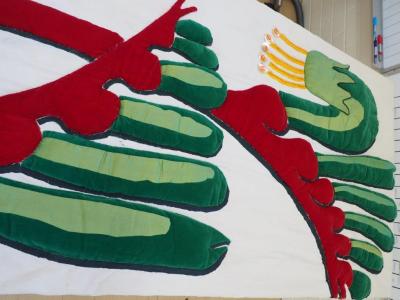REVERSE APPLIQUE, PANEL
This attractive example of the Mola Reverse Applique technique is typical of that made by the Kuna women of the San Blas Islands of Panama in Central America. Traditionally Molas are crafted from multiple layers of different coloured fabric, the design is created by precisely cutting through successive layers to reveal the underlying colours. Panels depicting ritual symbolism, animals, nature and scenes of daily life were traditionally incorporated into the garments and lives of the San Blas community. The technique was introduced to the Kuna people by the Spanish in the 16th century.
This multi-coloured cotton rectangular panel has a complex design of stylised birds, possibly chickens. One large bird to the centre of the panel which is overlayed with two chicks, freshly hatched from eggs, between a larger bird on each side. A stylised tree in each lower corner and random shapes fill the spaces between the birds. This item, made for the tourist market is stitched with a combination reverse and top stitched applique motifs.
Details
Details
Embroiderers' Guild of WA Textile Museum
Embroiderers' Guild of WA Textile Museum
More items like this
Other items from Embroiderers' Guild of WA Textile Museum
Scan this QR code to open this page on your phone ->

